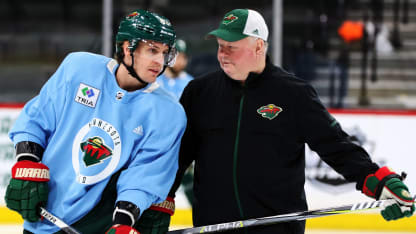Dan Myers: Having coached in and being a part of the All-Star Game experience last season, did you watch it at all and follow along this year with a bit of a different eye?
Bruce Boudreau: To me, it's a great spectacle of having the great players of the year there. The ones that deserve it that are having great years might not be household names, but they deserve to be there and that's fun to watch. But I wasn't enamored, quite frankly, when you're in a game like that -- when we coach a game, it's like live-or-die kind of thing -- the lack of emotion. Which you can expect, I guess. But I have a hard time doing it, because when I played in All-Star Games in the minor leagues, you knew scouts were watching and you tried your butt off because you wanted to do really well. Sometimes the effort's not there. I know when I coached in it, I'd find myself getting mad because when you're behind the bench, you still think of it as an NHL game.
DM: Is there any way to fix that? I know baseball had the home-field advantage thing going for a while, but that would be a difficult thing to do in the NHL.
BB: You know, I think baseball is the only really great All-Star Game, that means something. There's a lot of individual stuff and it's not as much of a team game. Home-field advantage in baseball was neat because it makes such a difference with the different styles. I don't think you can do it in hockey, but it might make it more interesting.
DM: You've talked a bunch about the standings this year and how tight everything is in the Central Division. Is it amazing to you when you wake up every morning and you see that this team rallied for a win or that team has extended its winning streak?
BB: I think that's one of the things that makes it great and maddening at the same time. You can't let it get to you. And the bottom line is, you have to just keep winning and not worrying about other teams. Because on any given night, teams are gonna lose and teams are gonna win. Someone is going to gain on you, or someone is going to pull away a little more. But you can only take care of what you can take care of. That's gotta be the thing you really focus on.
DM: You talked last week about parity and how next year, there will be a handful of teams that are better than everyone thought and some that may be worse. Is that good for hockey? Or do you miss the days like the old Montreal Canadiens dynasty where there were a couple of dominant teams every single year?
BB: Well, I was never a part of the dynasty, so I don't miss those days. And when you had to play Montreal every second night back then, it was no fun because you knew you probably weren't going to win. But in today's parity, you look at a team like Edmonton, at the beginning of the season, they were probably a lot of people's choice for the Western Conference and Vegas was going to be in last place.
I think next year, there's not much to regroup and Edmonton will probably be back there. Vancouver is ready to make a jump. And there's some teams that are going to fall out of it. That's what makes hockey great. You might lose a little bit of the fan base for one year, but they'll jump right back on as soon as you have some success again.
DM: The Wild's road record has been a point of discontent for much of the season. You even put some of the stats on the whiteboard for your players last week in Columbus. If there is one trend you could switch right now that would lead to immediate success away from home, what would it be?
BB: I think it'd be our penalty kill. There's quite a bit of discrepancy there between home and on the road and I think if we had the same percentage on the road as we do at home, we'd probably drop our goals against by a goal or a goal and a half per game. I think that would make all the difference in the world.

